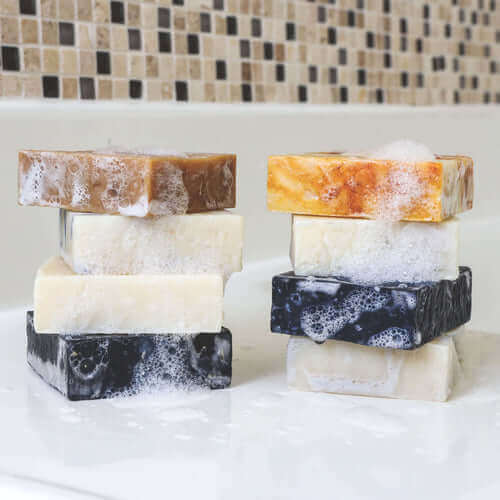
Bar Soap vs. Liquid Soap: Pros and Cons
Share
Washing our hands is a daily ritual, but have you ever wondered whether bar soap or liquid soap is better for you? Both have their loyal fans, but they come with their own sets of advantages and disadvantages. Let's dive into the pros and cons of each, so you can make an informed choice.
Bar Soap
Pros of Bar Soap
Bar soap has been around for ages and remains a staple in many households. Here are some of the benefits:
- Natural Ingredients: Many natural bar soaps are made from organic and natural ingredients like shea butter, olive oil, and essential oils. This makes them a great option for people with sensitive skin.
- Eco-Friendly: Bar soaps usually come with minimal packaging, often wrapped in recyclable paper or cardboard. This makes them a more sustainable choice compared to liquid soap.
- Cost-Effective: A single bar of soap can last a long time, making it more economical in the long run. Plus, you can find budget-friendly options like money soap bars that include a hidden surprise.
- Variety: From handmade soap and artisan soap to acne bar soap and bar soap for men, there's a wide range of options to suit different needs.
Cons of Bar Soap
While bar soap has its perks, it's not without drawbacks:
- Hygiene Concerns: Some people believe that bar soap can harbor germs, especially when shared among multiple users. However, studies show that the risk is minimal if the soap is rinsed off properly.
- Residue: Bar soap can leave a residue on soap dishes and sinks, requiring regular cleaning to keep things tidy.
- Drying: Some bar soaps can be drying to the skin, particularly those that aren't made with moisturizing ingredients.
Liquid Soap
Pros of Liquid Soap
Liquid soap has gained popularity in recent years. Here are some reasons why:
- Convenient: Liquid soap comes in pump bottles, making it easy to use and less likely to be dropped or wasted.
- Hygienic: Since you don't touch the soap itself, liquid soap is often considered more hygienic, especially in public settings.
- Moisturizing Options: Many liquid soaps contain added moisturizers like glycerin and aloe vera, which can help keep your skin soft and hydrated.
Cons of Liquid Soap
- Environmental Impact: Liquid soap often comes in plastic bottles, which contribute to plastic waste. Even if the bottles are recyclable, they still have a larger environmental footprint compared to bar soap.
- Cost: Liquid soap tends to be more expensive per use than bar soap.
- Ingredients: Some liquid soaps contain synthetic ingredients and chemicals that might not be as gentle on your skin as natural bar soaps.
Conclusion
Both bar soap and liquid soap have their own unique benefits and drawbacks. If you prioritize natural ingredients and sustainability, you might lean towards natural bar soap, artisan soap, or organic soap. On the other hand, if convenience and hygiene are your top concerns, liquid soap might be the way to go.
Ultimately, the choice between bar soap and liquid soap comes down to your personal preferences and needs. Why not try both and see which one you prefer?
Have you made your choice yet? Let us know your favorite in the comments!






